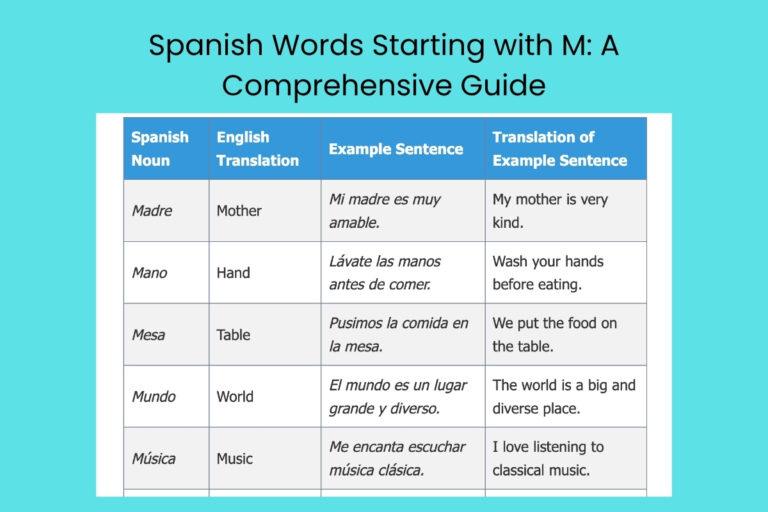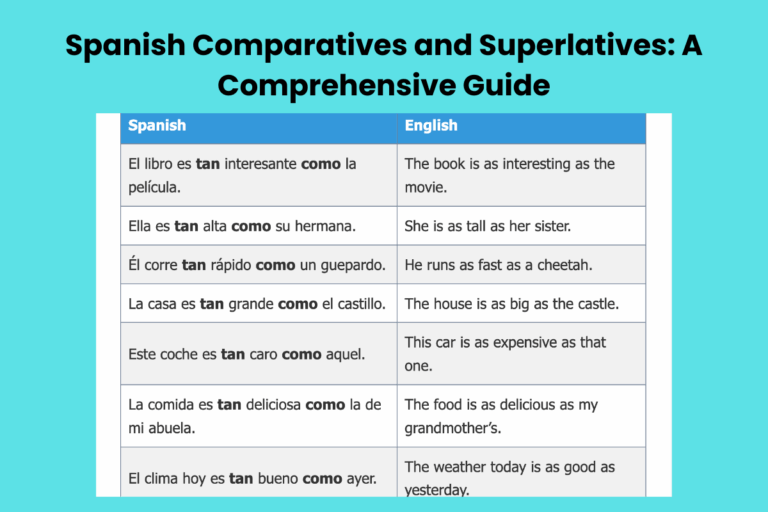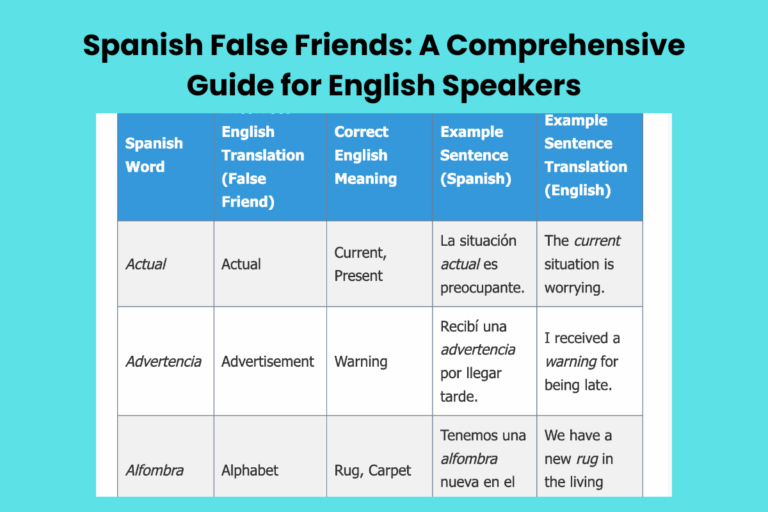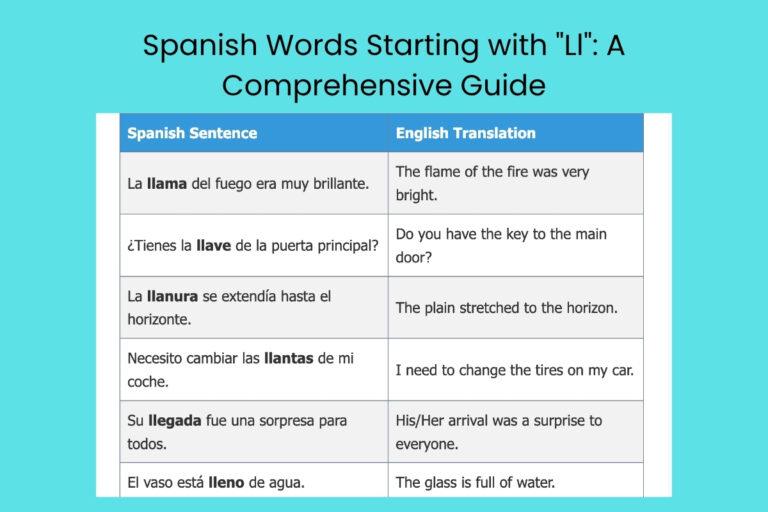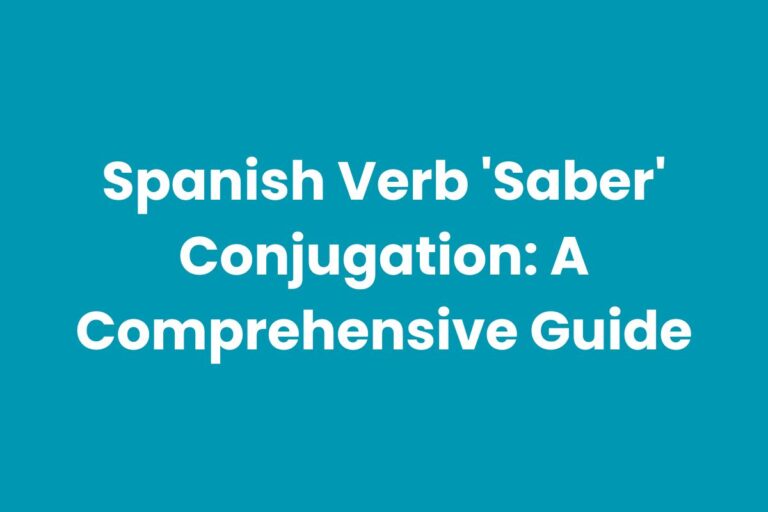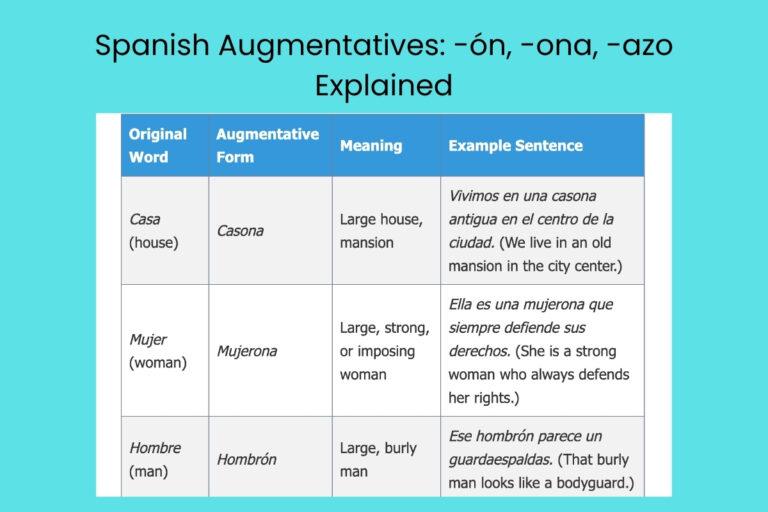Spanish Verb ‘Hacer’: A Comprehensive Conjugation Guide
Mastering the Spanish verb hacer, meaning “to do” or “to make,” is crucial for fluency. It’s one of the most frequently used verbs in the Spanish language, appearing in countless expressions and constructions. Understanding its conjugation and various uses will significantly improve your ability to communicate effectively in Spanish. This guide provides a detailed exploration of hacer, covering everything from its basic conjugations to its more advanced idiomatic expressions. Whether you’re a beginner or an advanced learner, this article will equip you with the knowledge and practice you need to confidently use hacer in your everyday Spanish conversations and writing.
This comprehensive guide is designed for Spanish language learners of all levels, from beginners just starting their journey to advanced students looking to refine their skills. It will be particularly beneficial for those who want to improve their conversational Spanish, understand complex sentence structures, and avoid common mistakes. By the end of this guide, you’ll have a solid understanding of how to conjugate and use the verb hacer in a variety of contexts, enabling you to express yourself more accurately and fluently in Spanish.
Table of Contents
- Definition of Hacer
- Structural Breakdown
- Types and Categories of Hacer Conjugations
- Examples of Hacer in Use
- Usage Rules for Hacer
- Common Mistakes with Hacer
- Practice Exercises
- Advanced Topics with Hacer
- Frequently Asked Questions (FAQ)
- Conclusion
Definition of Hacer
The Spanish verb hacer is a versatile and essential verb that primarily translates to “to do” or “to make” in English. It’s an irregular verb, meaning its conjugation patterns don’t strictly follow the standard rules for -er verbs. Hacer is used to express a wide range of actions, creations, and activities, making it one of the most frequently encountered verbs in the Spanish language. Its functionality extends beyond simple actions to include describing weather conditions, expressing time, and forming numerous idiomatic expressions.
Hacer functions as a transitive verb when it takes a direct object, indicating what is being done or made. For example, in the sentence “Yo hago la tarea” (I do the homework), la tarea is the direct object. It can also be used intransitively in certain contexts, particularly in idiomatic expressions or when the object is implied. The flexibility of hacer allows it to be used in both formal and informal settings, making it a cornerstone of Spanish communication.
Understanding the various uses of hacer is crucial for mastering Spanish. Its irregular conjugations and diverse applications require careful study and practice. However, with a solid grasp of its forms and meanings, you can significantly enhance your ability to express yourself clearly and accurately in Spanish. From simple everyday activities to complex ideas and nuances, hacer plays a vital role in conveying meaning in the Spanish language.
Structural Breakdown
The verb hacer is irregular, particularly in the first-person singular (yo) of the present indicative tense, where it becomes hago. This irregularity extends to other tenses and moods, including the preterite (hice), future subjunctive (hiciere), and imperfect subjunctive (hiciera/hiciese). The stem of the verb changes in these forms, deviating from the standard -er verb conjugation patterns.
The basic structure of conjugating hacer involves identifying the appropriate stem for each tense and mood and then adding the corresponding endings. For example, in the present indicative, the stem is hac- for most forms, except for the yo form. In the preterite, the stem changes to hic- for the yo, él/ella/usted, and ellos/ellas/ustedes forms. Understanding these stem changes is key to conjugating hacer correctly.
Furthermore, hacer is often used in compound tenses, such as the perfect tenses (he hecho, has hecho, etc.), where it functions as the past participle. In these cases, hecho is the invariable form used with the auxiliary verb haber. Additionally, hacer can be used in periphrastic constructions, such as hacer + infinitive, to express causation or obligation. For example, “Hice limpiar la casa” (I made them clean the house). These structural aspects highlight the complexity and versatility of hacer in Spanish grammar.
Types and Categories of Hacer Conjugations
The conjugation of hacer varies significantly depending on the mood and tense. Understanding these different categories is essential for accurate usage.
Indicative Mood
The indicative mood is used to express facts and objective statements. It includes various tenses, such as present, preterite, imperfect, future, and conditional.
Subjunctive Mood
The subjunctive mood is used to express doubts, wishes, emotions, and subjective opinions. It is often used in subordinate clauses and requires specific triggers in the main clause.
Imperative Mood
The imperative mood is used to give commands or instructions. It has only affirmative forms for tú, usted, nosotros, vosotros, and ustedes.
Conditional Mood
The conditional mood expresses hypothetical or conditional actions. It is often used to express what would happen under certain circumstances.
Perfect Tenses
Perfect tenses are compound tenses that use the auxiliary verb haber and the past participle hecho to express actions that have been completed.
Progressive Tenses
Progressive tenses use the verb estar and the gerund (haciendo) to express actions that are in progress.
Examples of Hacer in Use
To illustrate the usage of hacer, here are several examples categorized by tense and mood.
Present Indicative Examples
The present indicative is used for actions happening now or habitual actions. The table below shows several examples of hacer in the present indicative.
| Pronoun | Conjugation | Example Sentence | English Translation |
|---|---|---|---|
| Yo | Hago | Yo hago mi tarea todos los días. | I do my homework every day. |
| Tú | Haces | Tú haces un buen trabajo. | You do a good job. |
| Él/Ella/Usted | Hace | Él hace la cena. | He makes dinner. |
| Nosotros | Hacemos | Nosotros hacemos ejercicio por la mañana. | We exercise in the morning. |
| Vosotros | Hacéis | Vosotros hacéis muchas preguntas. | You (plural, informal) ask many questions. |
| Ellos/Ellas/Ustedes | Hacen | Ellos hacen planes para el fin de semana. | They make plans for the weekend. |
| Yo | Hago | Yo hago lo mejor que puedo. | I do the best I can. |
| Tú | Haces | ¿Qué haces este fin de semana? | What are you doing this weekend? |
| Él/Ella/Usted | Hace | Ella hace pasteles deliciosos. | She makes delicious cakes. |
| Nosotros | Hacemos | Nosotros hacemos un viaje a España. | We are taking a trip to Spain. |
| Vosotros | Hacéis | Vosotros hacéis la diferencia. | You (plural, informal) make a difference. |
| Ellos/Ellas/Ustedes | Hacen | Ellos hacen música juntos. | They make music together. |
| Yo | Hago | Yo hago café cada mañana. | I make coffee every morning. |
| Tú | Haces | Tú haces reír a la gente. | You make people laugh. |
| Él/Ella/Usted | Hace | Él hace mucho calor hoy. | It is very hot today. |
| Nosotros | Hacemos | Nosotros hacemos lo correcto. | We do the right thing. |
| Vosotros | Hacéis | Vosotros hacéis deporte. | You (plural, informal) do sports. |
| Ellos/Ellas/Ustedes | Hacen | Ellos hacen una fiesta. | They are having a party. |
| Yo | Hago | Yo hago una pregunta. | I am asking a question. |
| Tú | Haces | Tú haces un esfuerzo. | You make an effort. |
| Él/Ella/Usted | Hace | Él hace viento. | It is windy. |
| Nosotros | Hacemos | Nosotros hacemos un pastel. | We are making a cake. |
| Vosotros | Hacéis | Vosotros hacéis planes. | You (plural, informal) make plans. |
| Ellos/Ellas/Ustedes | Hacen | Ellos hacen ruido. | They make noise. |
Preterite Indicative Examples
The preterite indicative is used for completed actions in the past. The table below shows several examples of hacer in the preterite indicative.
| Pronoun | Conjugation | Example Sentence | English Translation |
|---|---|---|---|
| Yo | Hice | Yo hice la tarea ayer. | I did the homework yesterday. |
| Tú | Hiciste | Tú hiciste un buen trabajo. | You did a good job. |
| Él/Ella/Usted | Hizo | Él hizo la cena anoche. | He made dinner last night. |
| Nosotros | Hicimos | Nosotros hicimos ejercicio por la mañana. | We exercised in the morning. |
| Vosotros | Hicisteis | Vosotros hicisteis muchas preguntas. | You (plural, informal) asked many questions. |
| Ellos/Ellas/Ustedes | Hicieron | Ellos hicieron planes para el fin de semana. | They made plans for the weekend. |
| Yo | Hice | Yo hice lo que pude. | I did what I could. |
| Tú | Hiciste | ¿Qué hiciste ayer? | What did you do yesterday? |
| Él/Ella/Usted | Hizo | Ella hizo un pastel para su cumpleaños. | She made a cake for her birthday. |
| Nosotros | Hicimos | Nosotros hicimos un viaje a la playa. | We took a trip to the beach. |
| Vosotros | Hicisteis | Vosotros hicisteis un gran esfuerzo. | You (plural, informal) made a great effort. |
| Ellos/Ellas/Ustedes | Hicieron | Ellos hicieron una fiesta sorpresa. | They had a surprise party. |
| Yo | Hice | Yo hice una reserva en el restaurante. | I made a reservation at the restaurant. |
| Tú | Hiciste | Tú hiciste una pregunta importante. | You asked an important question. |
| Él/Ella/Usted | Hizo | Él hizo un descubrimiento interesante. | He made an interesting discovery. |
| Nosotros | Hicimos | Nosotros hicimos una promesa. | We made a promise. |
| Vosotros | Hicisteis | Vosotros hicisteis un buen trabajo en equipo. | You (plural, informal) did a good teamwork. |
| Ellos/Ellas/Ustedes | Hicieron | Ellos hicieron planes para el futuro. | They made plans for the future. |
| Yo | Hice | Yo hice una llamada telefónica. | I made a phone call. |
| Tú | Hiciste | Tú hiciste una contribución valiosa. | You made a valuable contribution. |
| Él/Ella/Usted | Hizo | Él hizo una presentación excelente. | He made an excellent presentation. |
| Nosotros | Hicimos | Nosotros hicimos una investigación exhaustiva. | We did a thorough investigation. |
| Vosotros | Hicisteis | Vosotros hicisteis una buena elección. | You (plural, informal) made a good choice. |
| Ellos/Ellas/Ustedes | Hicieron | Ellos hicieron una donación a la caridad. | They made a donation to charity. |
Imperfect Indicative Examples
The imperfect indicative is used for ongoing or habitual actions in the past. The table below shows several examples of hacer in the imperfect indicative.
| Pronoun | Conjugation | Example Sentence | English Translation |
|---|---|---|---|
| Yo | Hacía | Yo hacía mi tarea cuando era niño. | I used to do my homework when I was a child. |
| Tú | Hacías | Tú hacías un buen trabajo antes. | You used to do a good job before. |
| Él/Ella/Usted | Hacía | Él hacía la cena todas las noches. | He used to make dinner every night. |
| Nosotros | Hacíamos | Nosotros hacíamos ejercicio por la mañana. | We used to exercise in the morning. |
| Vosotros | Hacíais | Vosotros hacíais muchas preguntas en clase. | You (plural, informal) used to ask many questions in class. |
| Ellos/Ellas/Ustedes | Hacían | Ellos hacían planes para el fin de semana. | They used to make plans for the weekend. |
| Yo | Hacía | Yo hacía lo que me decían. | I used to do what they told me. |
| Tú | Hacías | ¿Qué hacías cuando eras joven? | What did you used to do when you were young? |
| Él/Ella/Usted | Hacía | Ella hacía pasteles para la tienda. | She used to make cakes for the store. |
| Nosotros | Hacíamos | Nosotros hacíamos viajes a la montaña. | We used to take trips to the mountains. |
| Vosotros | Hacíais | Vosotros hacíais deporte todos los días. | You (plural, informal) used to play sports every day. |
| Ellos/Ellas/Ustedes | Hacían | Ellos hacían música en la calle. | They used to make music in the street. |
| Yo | Hacía | Yo hacía café para todos en la oficina. | I used to make coffee for everyone in the office. |
| Tú | Hacías | Tú hacías reír a tus amigos. | You used to make your friends laugh. |
| Él/Ella/Usted | Hacía | Hacía frío en invierno. | It used to be cold in winter. |
| Nosotros | Hacíamos | Nosotros hacíamos lo posible por ayudar. | We used to do our best to help. |
| Vosotros | Hacíais | Vosotros hacíais muchas preguntas interesantes. | You (plural, informal) used to ask many interesting questions. |
| Ellos/Ellas/Ustedes | Hacían | Ellos hacían una fiesta cada año. | They used to have a party every year. |
| Yo | Hacía | Yo hacía una caminata por el parque. | I used to take a walk in the park. |
| Tú | Hacías | Tú hacías un esfuerzo por ser amable. | You used to make an effort to be kind. |
| Él/Ella/Usted | Hacía | Hacía viento en la costa. | It used to be windy on the coast. |
| Nosotros | Hacíamos | Nosotros hacíamos un pastel para las fiestas. | We used to make a cake for the holidays. |
| Vosotros | Hacíais | Vosotros hacíais planes para las vacaciones. | You (plural, informal) used to make plans for the vacations. |
| Ellos/Ellas/Ustedes | Hacían | Ellos hacían mucho ruido por la noche. | They used to make a lot of noise at night. |
Future Indicative Examples
The future indicative is used for actions that will happen in the future. The table below shows several examples of hacer in the future indicative.
| Pronoun | Conjugation | Example Sentence | English Translation |
|---|---|---|---|
| Yo | Haré | Yo haré la tarea mañana. | I will do the homework tomorrow. |
| Tú | Harás | Tú harás un buen trabajo. | You will do a good job. |
| Él/Ella/Usted | Hará | Él hará la cena esta noche. | He will make dinner tonight. |
| Nosotros | Haremos | Nosotros haremos ejercicio por la mañana. | We will exercise in the morning. |
| Vosotros | Haréis | Vosotros haréis muchas preguntas. | You (plural, informal) will ask many questions. |
| Ellos/Ellas/Ustedes | Harán | Ellos harán planes para el fin de semana. | They will make plans for the weekend. |
Conditional Examples
The conditional mood expresses hypothetical situations. The table below shows examples with conditional tense.
| Pronoun | Conjugation | Example Sentence | English Translation |
|---|---|---|---|
| Yo | Haría | Yo haría la tarea si tuviera tiempo. | I would do the homework if I had time. |
| Tú | Harías | Tú harías un buen trabajo si te esforzaras. | You would do a good job if you made an effort. |
| Él/Ella/Usted | Haría | Él haría la cena si supiera cocinar. | He would make dinner if he knew how to cook. |
| Nosotros | Haríamos | Nosotros haríamos ejercicio si no lloviera. | We would exercise if it didn’t rain. |
| Vosotros | Haríais | Vosotros haríais muchas preguntas si estuvierais interesados. | You (plural, informal) would ask many questions if you were interested. |
| Ellos/Ellas/Ustedes | Harían | Ellos harían planes si tuvieran dinero. | They would make plans if they had money. |
Subjunctive Examples
The subjunctive mood is used in dependent clauses to express doubts, wishes, and possibilities.
| Pronoun | Conjugation | Example Sentence | English Translation |
|---|---|---|---|
| Yo | Haga | Espero que yo haga un buen trabajo. | I hope that I do a good job. |
| Tú | Hagas | Es importante que tú hagas tu tarea. | It is important that you do your homework. |
| Él/Ella/Usted | Haga | Es necesario que él haga la cena. | It is necessary that he makes dinner. |
| Nosotros | Hagamos | Es bueno que nosotros hagamos ejercicio. | It is good that we exercise. |
| Vosotros | Hagáis | Es esencial que vosotros hagáis preguntas. | It is essential that you (plural, informal) ask questions. |
| Ellos/Ellas/Ustedes | Hagan | Es posible que ellos hagan planes. | It is possible that they make plans. |
Imperative Examples
The imperative mood is used to give commands or instructions.
| Pronoun | Conjugation | Example Sentence | English Translation |
|---|---|---|---|
| Tú | Haz | Haz la tarea ahora. | Do the homework now. |
| Usted | Haga | Haga el favor de cerrar la puerta. | Please do me the favor of closing the door. |
| Nosotros | Hagamos | Hagamos ejercicio juntos. | Let’s exercise together. |
| Vosotros | Haced | Haced vuestro trabajo. | Do your (plural, informal) work. |
| Ustedes | Hagan | Hagan silencio, por favor. | Please be quiet. |
Usage Rules for Hacer
Hacer has several distinct usage rules that dictate its proper application in various contexts.
Expressing Actions and Activities
Hacer is commonly used to describe actions or activities, similar to “do” or “make” in English. For example, “hacer la tarea” (to do homework) or “hacer una pregunta” (to ask a question).
Making Things and Creating
When referring to the creation or production of something, hacer is the appropriate verb. Examples include “hacer un pastel” (to make a cake) or “hacer una casa” (to build a house).
Discussing Weather
Hacer is also used to describe weather conditions, often in impersonal constructions. For example, “hace frío” (it’s cold) or “hace calor” (it’s hot).
Idiomatic Expressions with Hacer
Spanish is rich with idiomatic expressions using hacer. These expressions often have meanings that are not immediately obvious from the literal translation of the words. Examples include “hacer caso” (to pay attention) and “hacer falta” (to be necessary).
Common Mistakes with Hacer
One common mistake is confusing hacer with other verbs like realizar or efectuar. While these verbs can sometimes be used interchangeably, hacer is generally more versatile and frequently used in everyday language. Another mistake is incorrect conjugation, especially in the irregular forms like hago (yo form in present indicative) and hice (yo form in preterite).
Another frequent error is using hacer when tener is more appropriate. For example, saying “hago hambre” instead of “tengo hambre” (I am hungry). Remember that hacer is for “doing” or “making,” while tener is for “having.”
Here are some examples of common mistakes and their corrections:
| Incorrect | Correct | Explanation |
|---|---|---|
| Yo hago hambre. | Yo tengo hambre. | Use tener for expressing hunger. |
| Él hace un libro. | Él está escribiendo un libro. / Él escribe un libro. | “Hacer” is not typically used for the general act of “writing” a book; rather use “escribir”. |
| Nosotros hacemos un error. | Nosotros cometemos un error. | Use cometer for “to make a mistake.” |
| Hago diez años. | Tengo diez años. | Use tener for expressing age. |
| Hago la cama ahora. | Estoy haciendo la cama ahora. | While correct, “estoy haciendo la cama” is more common to indicate present progressive action. |
Practice Exercises
Test your understanding of hacer with these exercises.
Exercise 1: Fill in the blanks with the correct form of hacer in the present indicative.
| Sentence | Answer |
|---|---|
| Yo __________ la cena. | hago |
| Tú __________ la tarea. | haces |
| Él __________ un buen trabajo. | hace |
| Nosotros __________ ejercicio. | hacemos |
| Vosotros __________ preguntas. | hacéis |
| Ellos __________ planes. | hacen |
| Yo __________ lo que puedo. | hago |
| ¿Qué __________ tú? | haces |
| Ella __________ pasteles. | hace |
| Nosotros __________ un viaje. | hacemos |
Exercise 2: Conjugate hacer in the preterite indicative for each pronoun.
| Pronoun | Answer |
|---|---|
| Yo | hice |
| Tú | hiciste |
| Él/Ella/Usted | hizo |
| Nosotros | hicimos |
| Vosotros | hicisteis |
| Ellos/Ellas/Ustedes | hicieron |
Exercise 3: Translate the following sentences into Spanish using the correct form of hacer.
|
English Sentence |
Answer |
|---|---|
| I do my homework every day. | Yo hago mi tarea todos los días. |
| She makes dinner tonight. | Ella hace la cena esta noche. |
| We will make a cake for the party. | Nosotros haremos un pastel para la fiesta. |
| They did a good job yesterday. | Ellos hicieron un buen trabajo ayer. |
| It is cold today. | Hace frío hoy. |
Advanced Topics with Hacer
For advanced learners, understanding more complex uses of hacer can further enhance fluency.
Hacer que Construction
The construction hacer que is used to express causation, meaning “to make someone do something.” It requires the subjunctive mood in the subordinate clause. For example, “Hice que limpiara la casa” (I made him clean the house).
Hacerse Reflexive Use
Hacerse is the reflexive form of hacer and can mean “to become” or “to pretend to be.” It implies a change in state or condition. For example, “Se hizo famoso” (He became famous) or “Se hace el tonto” (He pretends to be foolish).
Literary and Formal Uses of Hacer
In literature and formal contexts, hacer can appear in more nuanced and complex constructions. These uses often involve a deeper understanding of Spanish grammar and cultural context, adding richness and depth to the language.
Frequently Asked Questions (FAQ)
Conclusion
The verb hacer is a cornerstone of the Spanish language, essential for expressing a wide range of actions, creations, and conditions. Its versatility and frequency make it a crucial verb to master for anyone seeking fluency in Spanish. From basic conjugations to advanced idiomatic expressions, understanding hacer will significantly improve your ability to communicate effectively and accurately.
By studying the various tenses, moods, and usage rules outlined in this guide, you can confidently incorporate hacer into your everyday Spanish conversations and writing. Remember to practice regularly, pay attention to common mistakes, and explore advanced topics to further enhance your understanding. With dedication and persistence, you’ll be well on your way to mastering this essential Spanish verb.


